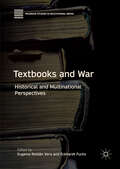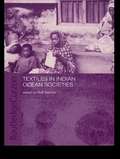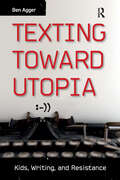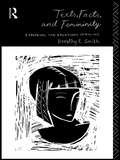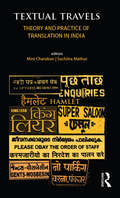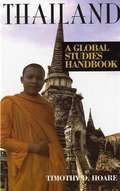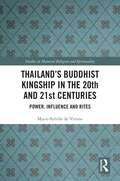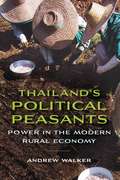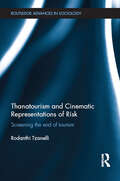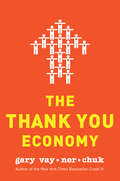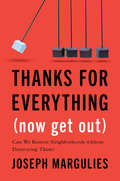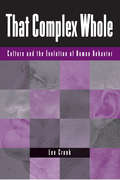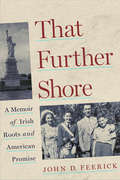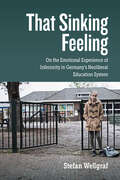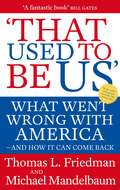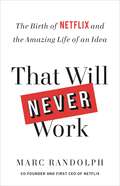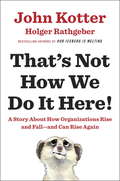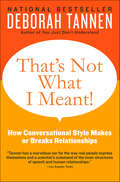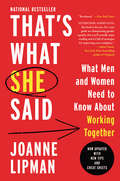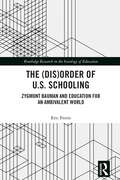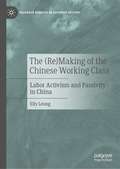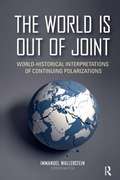- Table View
- List View
Textbooks and War: Historical and Multinational Perspectives (Palgrave Studies in Educational Media)
by Eugenia Roldán Vera Eckhardt FuchsThis volume reflects on the role played by textbooks in the complex relationship between war and education from a historical and multinational perspective, asking how textbook content and production can play a part in these processes. It has long been established that history textbooks play a key role in shaping the next generation’s understanding of both past events and the concept of ‘friend’ and ‘foe’. Considering both current and historical textbooks, often through a bi-national comparative approach, the editors and contributors investigate various important aspects of the relationships between textbooks and war, including the role wars play in the creation of national identities (whether the country is on the winning or losing side), the effacement of international wars to highlight a country’s exceptionalism, or the obscuring of intra-national conflict through the ways in which a civil war is portrayed. This pioneering book will be of interest and value to students and scholars of textbooks, educational media and the relationships between curricula and war.
Textiles in Indian Ocean Societies (Routledge Indian Ocean Series)
by Ruth BarnesTextiles in Indian Ocean Societies considers the importance of trade, and the transformation of the meaning of objects has the move between different cultures. It also addresses issues of gender, ethnic and religious identity, and economic status. The book covers a broad geographic range from East Africa to Southeast Asia, and references a number of disciplines such as anthropology, art history and history.This volume is timely, as both the social sciences and historical studies have developed a new interest in material culture. Edited by a foremost expert in the region, it will add considerably to our understanding of historical and current societies in the Indian Ocean region.
Texting Toward Utopia: Kids, Writing, and Resistance
by Ben AggerThis book examines the contemporary era where parents complain that children today don't do their homework because they are distracted by the Internet, texting, and video games. Texting Toward Utopia presents the writings of todays children and develops the argument that this is actually a time of mass literary, in which young people write furiously, albeit often below the adult radar. Agger argues that where texting replaces textbooks, the writing may be emoticon-laden, slangy, or terse, but it is still profound, as children (and their parents) engage in resistance and write for a better world. This book is a guide to understanding the meeting point between a new generation of children and new communication technologies.
Texts, Facts and Femininity: Exploring the Relations of Ruling
by Dorothy E. Smith'A crucial book for feminists, for sociology and the new "political anthropological historical school". It informs us how we are differently "situated" in and through social relations, which texts and images mediate, organise and construct.' Philip Corrigan, Professor of Applied Sociology, Exeter University Dorothy E. Smith is Professor of Sociology in Education, Ontario Institute for Studies in Education, Toronto. She is the author of The Everyday World as Problematic: A Feminist Sociology.
Textsoziologie: Eine kritische Einführung in die Diskurssemiotik
by Peter V. ZimaIm Anschluss an Adorno, Bachtin und Greimas’ Strukturale Semiotik analysiert Zima die Einwirkung sozialer Entwicklungen und Konfliktlinien auf literarische (und theoretische) Diskurse. Dabei geht es ebenso um Gattungsentwicklungen wie um semantische und syntaktische Strukturen einzelner Texte. Stets wird versucht, Gesellschaft und Literatur über die Sprache miteinander zu vermitteln. Der Band bietet vertiefte Analysen zu Proust, Musil und Kafka. Die Neuauflage enthält neue Kapitel zu den Begriffen der soziolinguistischen Situation, des Soziolekts sowie der Intertextualität und dehnt die Textsoziologie auf die Institutionalisierung literarischer Sprachen aus.
Textual Travels: Theory and Practice of Translation in India
by Mini Chandran Suchitra MathurThis book presents a comprehensive account of the theory and practice of translation in India in combining both its functional and literary aspects. It explores how the cultural politics of globalization is played out most powerfully in the realm of popular culture, and especially the role of translation in its practical facets, ranging from the fields of literature and publishing to media and sports.
Thailand: A Global Studies Handbook
by Timothy D. HoareHoare (humanities and religion, Johnson County Community College, Overland Park, Kansas) draws on his own experience and knowledge from numerous visits to Thailand, dissertation field research in Bangkok, and 15-plus years of marriage to a Thai native in creating a reference text for students, travelers, business people, and interested general readers. The text includes narrative chapters on Thai history, geography, demographics, economy, social institutions, and contemporary issues. It also contains a timeline of key events in Thailand's history; an alphabetical listing of significant people, places, and events; a concise guide to Thai language, food, and etiquette; a directory of business, cultural, government, and tourist organizations; and an annotated bibliography of print and non-print resources.
Thailand’s Buddhist Kingship in the 20th and 21st Centuries: Power, Influence and Rites (Studies in Material Religion and Spirituality)
by Marie-Sybille de VienneBased on two decades of fieldwork, including over a hundred interviews with various political and economic actors at different social levels, as well as documentary and media analysis, this volume presents an account of the Buddhist monarchy in Thailand, offering a sociology of elites, an analysis of the economic influence of the Crown and an examination of the magic and ritual dimension of kingship. An exploration of the role and status of the Palace over the last century, whether as a guarantor of democracy, a symbol of stability, a source of power or an object of popular discontent, Thailand’s Buddhist Kingship in the 20th and 21st Centuries will appeal to scholars of sociology and anthropology with interests in material religion, politics and Southeast Asian studies.
Thailand's Political Peasants
by Andrew WalkerWhen a populist movement elected Thaksin Shinawatra as Prime Minister of Thailand in 2001, many of the country’s urban elite dismissed the outcome as just another symptom of rural corruption, a traditional patronage system dominated by local strongmen pressuring their neighbors through political bullying and vote-buying. InThailand’s Political Peasants, however, Andrew Walker argues that the emergence of an entirely new socioeconomic dynamic has dramatically changed the relations of Thai peasants with the state, making them a political force to be reckoned with. Whereas their ancestors focused on subsistence, this generation of middle-income peasants seeks productive relationships with sources of state power, produces cash crops, and derives additional income through non-agricultural work. In the increasingly decentralized, disaggregated country, rural villagers and farmers have themselves become entrepreneurs and agents of the state at the local level, while the state has changed from an extractor of taxes to a supplier of subsidies and a patron of development projects. Thailand’s Political Peasantsprovides an original, provocative analysis that encourages an ethnographic rethinking of rural politics in rapidly developing countries. Drawing on six years of fieldwork in Ban Tiam, a rural village in northern Thailand, Walker shows how analyses of peasant politics that focus primarily on rebellion, resistance, and evasion are becoming less useful for understanding emergent forms of political society.
Thanatologie: Eine historisch-anthropologische Orientierung (essentials)
by Bernd HerrmannBestattungsritual und Behandlung der Toten sind elementare Merkmale einer Kultur. Eine Gesellschaft gibt sich im Bestattungsritual, in der Behandlung der Toten und in den Vor- wie Nachbereitungen der Beisetzung über die soziale Identität des Verstorbenen und über den Zusammenhalt der Gemeinschaft Rechenschaft. In der Thanatologie werden mit den Mitteln von Archäologie und Prähistorischer Anthropologie die praxeologischen Zeichen rekonstruiert, soweit sie materielle Spuren im Quellenmaterial und in dessen Umfeld hinterlassen haben. Dargestellt sind die gängigen Überlieferungsformen von menschlichen Überresten und mögliche Zugänge zur Dekodierung der in ihnen wie in den Auffindesituationen enthaltenen Zeichen. Mit Hinweisen zu den erforderlichen erkenntnistheoretischen Erwägungen bietet das essential insgesamt einen thematischen Überblick und Wegweiser.
Thanatourism and Cinematic Representations of Risk: Screening the End of Tourism (Routledge Advances in Sociology)
by Rodanthi TzanelliIn today’s world, the need to eliminate natural and human-made disasters has been at the forefront of national and international socio-political agendas. The management of risks such as terrorism, labour strikes, protests and environmental degradation has become pivotal for countries that depend on their economy’s tourist sector. Indeed, there is fear that that ‘the end of tourism’ might be nigh due to inadequate institutional foresight. Yet, in designing relevant policies to tackle this, arts such as that of filmmaking have yet to receive due consideration. This book adopts an unorthodox approach to debates about ‘the end of tourism’. Through twenty-first century cinematic narratives of symbolically interconnected ‘risks’ it considers how art envisages the future of humanity’s well-being. These ‘risks’ include: migration as an infectious disease; alien incursions as racialized labour mobilities; cyborg rebellion as the fear of post-colonial otherness; and zombie anthropophagy as the replacement of rooted identities by nomadic lifestyles. Such filmic scenarios articulate the futuristic survival of community as the triumph of the technological human over otherness, and provide a means to debate societal risks that weave identity politics into unequal mobilities. This book will appeal to researchers and students interested in mobilities theory, tourism and travel theory, film studies and aesthetics, globalisation studies, race, labour and migration.
The Thank You Economy
by Gary Vaynerchuk“Gary Vaynerchuk has seen the future of marketing. The Thank You Economy shows how it's built on both the time-honored techniques of listening to and appreciating customers and newer services like Twitter that allow you to engage directly with customers at unprecedented scale and speed. The book, like Gary, is also a lot of fun and full of passion.” —Dick Costolo, chief executive officer, TwitterGary Vaynerchuk, the New York Times bestselling author and creator of Wine Library TV, is back with a bold and expansive look at the evolution of today's marketplace, revealing the essential factors defining and driving successful relationships between businesses and consumers. In this groundbreaking follow-up to the bestselling Crush It!, Vaynerchuk—one of Bloomberg Businessweek’s “20 People Every Entrepreneur Should Follow”—looks beyond a numbers-based analysis to explore the value of social interactions in building our economy.
Thanks for Everything (Now Get Out): Can We Restore Neighborhoods without Destroying Them?
by Joseph MarguliesWhen a distressed urban neighborhood gentrifies, all the ratios change: poor to rich; Black and Brown to white; unskilled to professional; vulnerable to secure. Vacant lots and toxic dumps become condos and parks. Upscale restaurants open and pawn shops close. But the low-income residents who held on when the neighborhood was at its worst, who worked so hard to make it better, are gradually driven out. For them, the neighborhood hasn&’t been restored so much as destroyed. Tracing the history of Olneyville, a neighborhood in Providence, Rhode Island, that has traveled the long arc from urban decay to the cusp of gentrification, Joseph Margulies asks the most important question facing cities today: Can we restore distressed neighborhoods without setting the stage for their destruction? Is failure the inevitable cost of success? Based on years of interviews and on-the-ground observation, Margulies argues that to save Olneyville and thousands of neighborhoods like it, we need to empower low-income residents by giving them ownership and control of neighborhood assets. His model for a new form of neighborhood organization—the &“neighborhood trust&”—is already gaining traction nationwide and promises to give the poor what they have never had in this country: the power to control their future.
That Complex Whole: Culture And The Evolution Of Human Behavior
by Lee CronkOur understanding of the evolution of human behavior has grown enormously over the past few decades, and an increasing number of behavioral and social scientists are making use of evolutionary theory in their work to shed light on issues ranging from marriage and parenting to the study of mental illness. The success of this research program is thre
That Further Shore: A Memoir of Irish Roots and American Promise
by John D. FeerickA rare and evocative memoir of a respected constitutional scholar, dedicated public servant, political reformer, and facilitator of peace in the land of his ancestors.John D. Feerick’s life has all the elements of a modern Horatio Alger story: the poor boy who achieves success by dint of his hard work. But Feerick brought other elements to that classic American success story: his deep religious faith, his integrity, and his paramount concern for social justice. In his memoir, The Further Shore, Feerick shares his inspiring story, from his humble beginnings: born to immigrant parents in the South Bronx, going on to practice law, participating in framing the U.S. Constitution’s Twenty-Fifth Amendment, serving as dean of Fordham Law, and serving as President of the New York City Bar Association and chair of state commissions on government integrity.Beginning with Feerick’s ancestry and early life experiences, including a detailed genealogical description of Feerick’s Irish ancestors in County Mayo and his laborious quest to identify them and their relationships with one another, the book then presents an evocative survey of the now-vanished world of a working-class Irish Catholic neighborhood in the South Bronx. Feerick’s account of how he financed his education from elementary school through law school is a moving tribute to the immigrant work ethic that he inherited from his parents and shared with many young Americans of his generation. The book then traces Feerick’s career as a lawyer and how he gave up a lucrative partnership in a prestigious New York City law firm at an early age to accept the office of Dean of the Fordham School of Law at a fraction of his previous income because he felt it was time to give back something to the world.John Feerick has consistently shown his commitment to the law as a vocation as well as a profession by his efforts to protect the rights of the poor, to enable minorities to achieve their rightful places in American society, and to combat political corruption. That Further Shore is an inspiring memoir of how one humble and decent man helped to make America a more just and equitable society.
That Futebol Feeling: Sport and Play in Brazil's Heartland
by David FaflikFutebol, or soccer for Americans, is the planet’s spectator sport of choice. In the Brazilian state of Minas Gerais, nestled in the country’s southeastern heartland, futebol generates powerful, lifelong emotions. That Futebol Feeling captures the region’s enthrallment with “the beautiful game,” and shows us how and why play is central to the human condition. David Faflik profiles members of the most celebrated local team, Clube Atlético Mineiro (CAM), as well as its passionate, never-say-die fans, to show how futebol and fandom shape their everyday lives and perspectives. He discovers bonds of work and play, as well as pride, identity, and community. Additionally, Faflik’s analysis of Brazil’s futebol culture reflects sports fandom worldwide. CAM stands as a symbol for a way of life in Minas Gerais, the birthplace of Pelé. Faflik interrogates what playing the game means to those who dedicate their lives to the sport. He writes, “The feelings that football inspires are the best of me.” That Futebol Feeling shares that special feeling with the rest of us.
That Sinking Feeling: On the Emotional Experience of Inferiority in Germany's Neoliberal Education System
by Stefan WellgrafEmotions, especially those of impoverished migrant families, have long been underrepresented in German social and cultural studies. That Sinking Feeling raises the visibility of the emotional dimensions of exclusion processes and locates students in current social transformations. Drawing from a year of ethnographic fieldwork with grade ten students, Stefan Wellgraf’s study on an array of both classic emotions and affectively charged phenomena reveals a culture of devaluation and self-assertion of the youthful, post-migrant urban underclass in neoliberal times.
That Used To Be Us: What Went Wrong with America - and How It Can Come Back
by Thomas Friedman Michael MandelbaumAmerica has a huge problem. It faces four major challenges, on which its future depends, and it is failing to meet them. In What's Wrong with America?, Thomas L. Friedman and Michael Mandelbaum analyze those challenges - globalization, the revolution in information technology, the nation's chronic deficits, and its pattern of energy consumption - and spell out what needs to be done now to rediscover America's power and prowess.They explain how the end of the cold war blinded the nation to the need to address these issues seriously. They show how America's history, when properly understood, provides the key to coping successfully and explain how the paralysis of the US political system and the erosion of key American values have made it impossible to carry out the policies the country needs. What's Wrong with America? is both a searching exploration of the American condition today and a rousing manifesto for American renewal.
That Will Never Work: The Birth of Netflix and the Amazing Life of an Idea
by Marc RandolphIn the tradition of Phil Knight's Shoe Dog comes the incredible untold story of how Netflix went from concept to company-all revealed by co-founder and first CEO Marc Randolph. Once upon a time, brick-and-mortar video stores were king. Late fees were ubiquitous, video-streaming unheard was of, and widespread DVD adoption seemed about as imminent as flying cars. Indeed, these were the widely accepted laws of the land in 1997, when Marc Randolph had an idea. It was a simple thought-leveraging the internet to rent movies-and was just one of many more and far worse proposals, like personalized baseball bats and a shampoo delivery service, that Randolph would pitch to his business partner, Reed Hastings, on their commute to work each morning. But Hastings was intrigued, and the pair-with Hastings as the primary investor and Randolph as the CEO-founded a company. Now with over 150 million subscribers, Netflix's triumph feels inevitable, but the twenty first century's most disruptive start up began with few believers and calamity at every turn. From having to pitch his own mother on being an early investor, to the motel conference room that served as a first office, to server crashes on launch day, to the now-infamous meeting when Netflix brass pitched Blockbuster to acquire them, Marc Randolph's transformational journey exemplifies how anyone with grit, gut instincts and determination can change the world-even with an idea that many think will never work. What emerges,though, isn't just the inside story of one of the world's most iconic companies. Full of counter-intuitive concepts and written in binge-worthy prose, it answers some of our most fundamental questions about taking that leap of faith in business or in life: How do you begin? How do you weather disappointment and failure? How do you deal with success? What even is success? From idea generation to team building to knowing when it's time to let go, That Will Never Work is not only the ultimate follow-your-dreams parable, but also one of the most dramatic and insightful entrepreneurial stories of our time.
That's Not How We Do It Here!: A Story about How Organizations Rise and Fall--and Can Rise Again
by John Kotter Holger RathgeberWhat's the worst thing you can hear when you have a good idea at work?"That's not how we do it here!" In their iconic bestseller Our Iceberg Is Melting, John Kotter and Holger Rathgeber used a simple fable about penguins to explain the process of leading people through major changes. Now, ten years later, they're back with another must-read story that will help any team or organization cope with their biggest challenges and turn them into exciting opportunities. Once upon a time a clan of meerkats lived in the Kalahari, a region in southern Africa. After years of steady growth, a drought has sharply reduced the clan's resources, and deadly vulture attacks have increased. As things keep getting worse, the harmony of the clan is shattered. The executive team quarrels about possible solutions, and suggestions from frontline workers face a soul-crushing response: "That's not how we do it here!" So Nadia, a bright and adventurous meerkat, hits the road in search of new ideas to help her troubled clan. She discovers a much smaller group that operates very differently, with much more teamwork and agility. These meerkats have developed innovative solutions to find food and evade the vultures. But not everything in this small clan is as perfect as it seems at first. Can Nadia figure out how to combine the best of both worlds--a large, disciplined, well-managed clan and a small, informal, inspiring clan--before it's too late? This book distills Kotter's decades of experience and award-winning research to reveal why organizations rise and fall, and how they can rise again in the face of adversity.From the Hardcover edition.
That's Not What I Meant!: How Conversational Style Makes or Breaks Relationships
by Deborah TannenThe bestselling linguistics professor examines how we communicate with each other and how you can maintain an effective conversation.At home, on the job, in a personal relationship, it’s often not what you say but how you say it that counts.Deborah Tannen revolutionized our thinking about relationships between women and men in her #1 bestseller You Just Don’t Understand. In That’s Not What I Meant!, the internationally renowned sociolinguist and expert on communication demonstrates how our conversational signals—voice level, pitch and intonation, rhythm and timing, even the simple turns of phrase we choose—are powerful factors in the success or failure of any relationship. Regional speech characteristics, ethnic and class backgrounds, age, and individual personality all contribute to diverse conversational styles that can lead to frustration and misplaced blame if ignored—but provide tools to improve relationships if they are understood.At once eye-opening, astute, and vastly entertaining, Tannen’s classic work on interpersonal communication will help you to hear what isn’t said and to recognize how your personal conversational style meshes or clashes with others. It will give you a new understanding of communication that will enable you to make the adjustments that can save a conversation . . . or a relationship.“Tannen combines a novelist’s ear for the way people speak with a rare power of original analysis. . . . Fascinating.” —Oliver Sacks“We are, all of us, foreigners to each other: editor and writer, man and woman, Californian and New Yorker, friend and friend. Dr. Tannen shows us how different we are, and how to speak the same language.” —Jack Rosenthal, Pulitzer Prize winner and editor, The New York Times“Tannen has a marvelous ear for the way real people express themselves and a scientist’s command of the inner structures of speech and human relationships.” —Los Angeles Times
That's What She Said (and Women Need to Tell Them) About Working Together: What Men Need to Know (and Women Need to Tell Them) About Working Together
by Joanne LipmanGoing beyond the message of Lean In and The Confidence Code, Gannett’s Chief Content Officer contends that to achieve parity in the office, women don’t have to change—men do—and in this inclusive and realistic handbook, offers solutions to help professionals solve gender gap issues and achieve parity at work.Companies with more women in senior leadership perform better by virtually every financial measure, and women employees help boost creativity and can temper risky behavior—such as the financial gambles behind the 2008 economic collapse. Yet in the United States, ninety-five percent of Fortune 500 chief executives are men, and women hold only seventeen percent of seats on corporate boards. More men are reaching across the gender divide, genuinely trying to reinvent the culture and transform the way we work together. Despite these good intentions, fumbles, missteps, frustration, and misunderstanding continue to inflict real and lasting damage on women’s careers.What can the Enron scandal teach us about the way men and women communicate professionally? How does brain circuitry help explain men’s fear of women’s emotions at work? Why did Kimberly Clark blindly have an all-male team of executives in charge of their Kotex tampon line? In That’s What She Said, veteran media executive Joanne Lipman raises these intriguing questions and more to find workable solutions that individual managers, organizations, and policy makers can employ to make work more equitable and rewarding for all professionals.Filled with illuminating anecdotes, data from the most recent relevant studies, and stories from Lipman’s own journey to the top of a male-dominated industry, That’s What She Said is a book about success that persuasively shows why empowering women as true equals is an essential goal for us all—and offers a roadmap for getting there.
The: Zygmunt Bauman and Education for an Ambivalent World (Routledge Research in the Sociology of Education)
by Eric FerrisThis book critically interrogates the function of schooling in the United States of America using the writings of sociologist Zygmunt Bauman. Asking whether the function is to produce citizens, workers, a combination of the two, or something altogether different, it argues that the designs of schooling are part of a carefully crafted ordering, illustrated via an analysis of the ways in which schooling introduces students to various forms of coercion and seduction that socialize students in particular ways: ways that support an order. By engaging with the prolific and insightful works of one of the most prominent social thinkers of the 21st century, this book considers schooling and its contributions to order. Be they solid or liquid modern ordering mechanisms, ordering through repression and seduction, or supporting ordering through the creation of boundaries separating an “orderly inside” from its “disorderly outside,” schools imperfectly support the construction of order and in doing so, privilege some representations and individuals over others. To order is to harness ambivalence and steer it in directions that privilege the “in” group at the expense of the “out” group; and schools, from the curriculum they teach to the values and ideas they promote, are desirable captive marketplaces instrumental in steering this ambivalence. The author ultimately suggests that the function of schools, whether recognized or not, are not so much to educate students to be free thinkers, but rather to be orderly cogs in a particular functional social machine. As such, the book will be of interest to faculty, scholars, and postgraduate-level students with interests in the sociology of education, schooling, sociology, and social theory.
The: Labor Activism and Passivity in China (Palgrave Debates in Business History)
by Elly LeungThis book engages with Foucault’s theoretical works to understand the (re-) making of the working-class in China. In so doing, the author applies Foucault’s genealogical (historicalization) method to explore the ways the Chinese Communist Party (CCP) develop Chinese governmentality (or government of mentalities) among everyday workers in its thought management system. Through the investigation of the key events in Chinese history, she presents how China’s stable political party is sustained through the CCP’s ability to retain, update and incorporate many Confucian discourses into its contemporary form of thought management system using social networks, such as families and schools, to continuously (re-) shape workers’ consciousness into one that maintains their docility. This book will bring a new voice to the debate of Chinese working-class politics and labour movements. It will serve as a gateway to comprehensive knowledge about China for students and academics with interests in Chinese employment relations, Chinese politics, labourist activist culture, and social movements.
THE WORLD IS OUT OF JOINT (E): World-Historical Interpretations of Continuing Polarizations
by Immanuel WallersteinThe dominant view in social science has been that the modern world shows a pattern of linear development in which all positive social trends rise (albeit at an uncertain speed) toward a relatively homogenized world. In the post-1945 period, some analysts contested this linear model, arguing that the modern world was rather one of escalating polarization. Their view was strengthened by the separate emergence within the natural sciences of complexity studies, which suggested that natural systems inevitably moved away from equilibrium, and at a certain point bifurcated radically.This book, based on a truly collaborative international research project, evaluates the empirical evidence in this debate in order to (1) give an adequate portrayal of the historical realities of the world-system, (2) draw a nuanced assessment about this debate, and (3) provide the basis on which we can not only envisage probable future trends but also draw conclusions about the policy and/or political implications of past and future research.The work of ten research clusters, based on crucial topics of overlapping nodes of social activity, provides a vantage-point with which to assess the basic issue; a clear picture emerges of "world-historical interpretations of continuing polarizations."
